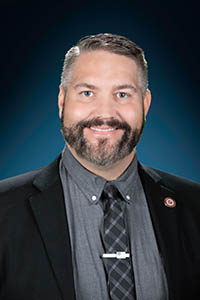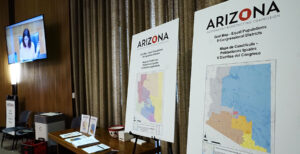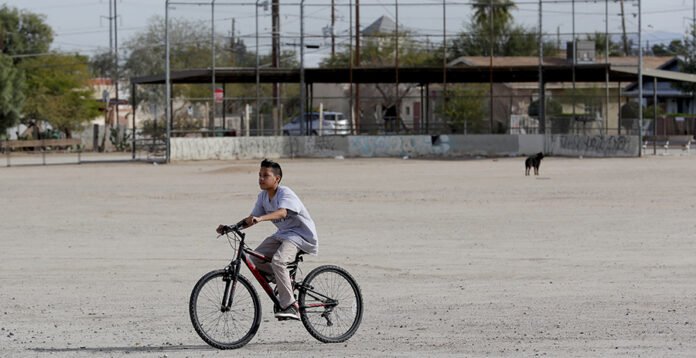Arizona would run its own census in 2030 and use only that citizen-count to redraw state legislative districts under a Republican-backed proposal that could be placed on the November ballot.
The reason, the sponsor acknowledges, has everything to do with illegal immigration.
The ballot referral is being touted by Rep. Justin Heap, a freshman Republican from Mesa, as a way to ensure that legislative districts are drawn without using what he called a skewed system that counts everyone instead of just people who are citizens and potentially eligible to vote.
And with a surge of migrants crossing the border in recent years during the Biden Administration, Heap said ensuring that only citizens are used to divvy up legislative seats is even more important. Congressional seats would continue to be apportioned by federal census data because of controlling federal law.
Immigration has been an issue in Arizona’s elections for years but is becoming an even more potent weapon in the battle between Republicans and Democrats this year because of the border crisis.

Putting it on the ballot as a proposed state law could be seen as a win for GOP strategists as they look to draw voters to their cause. Democrats, by contrast, are focusing on qualifying a ballot initiative ensuring the right to abortion in the state, an issue equally as important for getting their voters, moderates and many women to the polls.
Democrats inside and outside the Legislature see Heap’s effort as dangerous on multiple fronts, including spreading fear in immigrant communities if state census counters fan out in their neighborhoods trying to count them. That could cause them not to respond to official U.S. Census questionnaires, limit Arizona’s representation in Congress and have major impacts to federal funding in the state. An unknown and potentially huge cost is another factor.
But their biggest fear is that using only citizen counts to draw legislative districts could essentially cement a Republican majority in the Legislature for decades.
Democrats have been chipping away at the GOP majority for years as minorities who tend to back their party move to the state. And Republicans now only have a one-seat majority in each chamber.
Eliminating any non-citizens from the count used to draw legislative districts would very likely lead to more Republican-majority districts.
Heap never mentioned that in his presentations in the House, where his ballot referral sailed through with little debate and passed with only votes from majority Republicans.
But Sen. Priya Sundareshan, D-Tucson, said that’s going to end when the measure comes up this week in the Senate Appropriations Committee after languishing for weeks without advancing in the upper chamber.
“We in the Senate Democratic Caucus have significant concerns about this and what it may be, what it’s intended to do and the costs and the fear that it’s going to create,” Sundareshan said.
Heap pointed out during House hearings and in an interview that the 2020 U.S. Census was widely believed to have led to an undercount in Arizona, costing the state an additional Congressional district that had been widely expected. But if a state-run census leads to an even greater federal undercount because of fears it creates in the immigrant community, it could hurt congressional representation – and the money that flows from the official federal count, even more.

Heap’s proposal is optional, because it gives the Legislature the ability to forgo it because of costs or any other reason and just default to the federal census.
But in an interview with Capitol Media Services that he abruptly ended, Heap noted that the state-run census would ensure that the state’s 30 legislative districts are apportioned only with citizens, leaving out any immigrants, whether legally in the U.S. or not.
“It becomes a problem that citizenship is not going to be a standard for how we apportion out who’s going to vote,” he said.
“That’s going to throw off Arizona districts,” Heap said. “It’s going to concentrate districts that have large numbers of non-citizens living in it are going to be over-represented in the legislature where districts that have fewer people but more citizens are going to get less. So that is a substantial problem.”
Heap, who is challenging Maricopa County Recorder Stephen Richer in their party’s primary, repeatedly said that running a state census with a citizenship determination would not be a change from the federal census, because people were asked their status during the 2020 count.
“The last census asked about citizenship status, and I didn’t hear any complaints when that happened previously under Trump,” Heap said.
That’s not true.
The Trump Administration axed their proposal to add the question for the first time since 1950 after the U.S. Supreme Court sided with civil rights groups and some state and local governments who challenged the plan in 2019.
And like what Heap is now proposing, Trump’s plan did have a partisan tinge: former Gov. Doug Ducey, a Republican like Trump and Heap, told Capitol Media Services that year he supported a citizenship-only count.
Steve Gallardo, a former state senator who is now the only Democrat on the Maricopa County Board of Supervisors, called Heap’s proposal a recipe for ensuring GOP control and undermining the growing strength of the Democratic Party in the state.
“There’s no doubt in my mind, this is their way of not properly counting people of color who tend to vote Democratic,” Gallardo said.
“This is their way of trying to create a legislative map that would ensure Republican survival for years to come,” he said. “That’s what this is all about. This is political maneuvering by the Legislature and trying to control the process.”
The U.S. Census Bureau’s own experts predicted that millions of Hispanics would be undercounted if a federal citizenship question were to be added, according to The Associated Press coverage of the 2019 high court ruling.
Sundareshan echoed Gallardo’s concerns.
“Because the state has the final authority over how our legislative districts are drawn, this is absolutely an attempt to cement that (GOP) control, and to disenfranchise certain communities,” she said.
She also said she worried about GOP lawmakers hiring some of the same groups to do census work that did some door-knocking after the 2020 election. They were seeking non-citizen voters while the Senate was conducting the widely-mocked “audit” of Biden’s win.
“Basically, we think that this opens the door to the Legislature hiring out those kinds of organizations to do exactly the same thing,” Sundareshan said. “If you’re going up to a door and asking, ‘are you a citizen or not,’ I think that that’s a chilling question in some communities.”
No state has conducted its own census since South Dakota and Florida did counts in 1945, according the U.S. Census Bureau. All but nine states did them occasionally since the nation’s founding, but they gradually became more rare and ceased altogether after the Florida and South Dakota counts.
Heap was not questioned on the cost of running a state census by any lawmakers during House committee hearings or during floor sessions.
He did say the 2020 national head count cost about $18 billion (it actually came in at $14.2 billion, according to the Government Accountability Office). Arizona’s population is about 2% of the nation, so nearly $300 million was needed to count the state’s 7.15 million residents, using that metric.
And after ending the interview, Heap refused to provide any idea on costs or on who brought him the idea in a text message exchange.
He did say in the interview that the measure may need an appropriation to make it out of the Senate, although no amendments are currently proposed.
Regardless, Heap is sold on the idea, saying it is needed because of the huge surge of migrants into the country.
“We think it’s an important issue to bring, with our open border and the obvious crisis we have and the concerns,” he said.
“We need to start discussing citizenship voting, who decides who makes up our legislative districts, both state and federal,” Heap continued. Is it just anyone who lives here or is it the voting citizens? This is an attempt to address that.”



